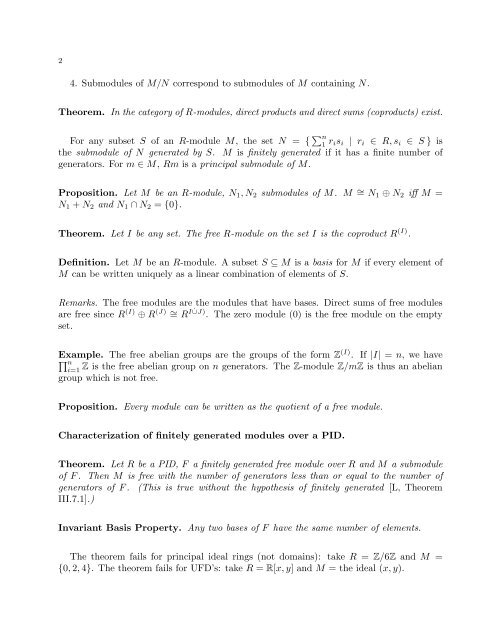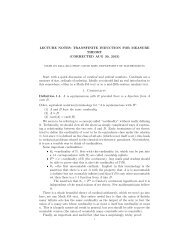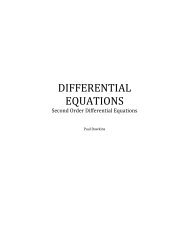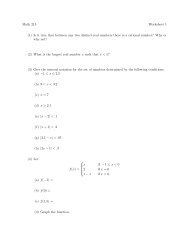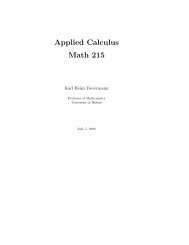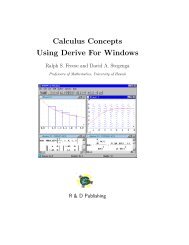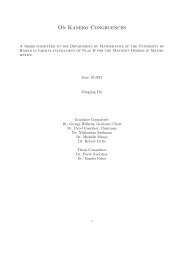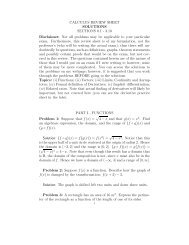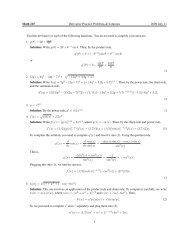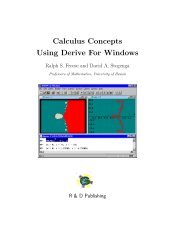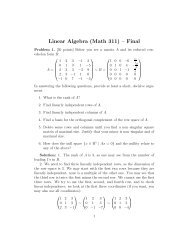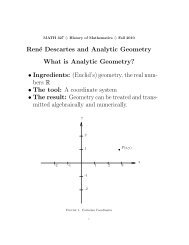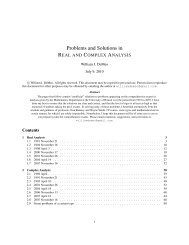Module Theory From now on, R will denote an arbitrary ring with 1 ...
Module Theory From now on, R will denote an arbitrary ring with 1 ...
Module Theory From now on, R will denote an arbitrary ring with 1 ...
You also want an ePaper? Increase the reach of your titles
YUMPU automatically turns print PDFs into web optimized ePapers that Google loves.
2<br />
4. Submodules of M/N corresp<strong>on</strong>d to submodules of M c<strong>on</strong>taining N.<br />
Theorem. In the category of R-modules, direct products <strong>an</strong>d direct sums (coproducts) exist.<br />
For <strong>an</strong>y subset S of <strong>an</strong> R-module M, the set N = { n<br />
1 risi | ri ∈ R, si ∈ S } is<br />
the submodule of N generated by S. M is finitely generated if it has a finite number of<br />
generators. For m ∈ M, Rm is a principal submodule of M.<br />
Propositi<strong>on</strong>. Let M be <strong>an</strong> R-module, N1,N2 submodules of M. M ∼ = N1 ⊕ N2 iff M =<br />
N1 + N2 <strong>an</strong>d N1 ∩ N2 = {0}.<br />
Theorem. Let I be <strong>an</strong>y set. The free R-module <strong>on</strong> the set I is the coproduct R (I) .<br />
Definiti<strong>on</strong>. Let M be <strong>an</strong> R-module. A subset S ⊆ M is a basis for M if every element of<br />
M c<strong>an</strong> be written uniquely as a linear combinati<strong>on</strong> of elements of S.<br />
Remarks. The free modules are the modules that have bases. Direct sums of free modules<br />
are free since R (I) ⊕ R (J) ∼ = R I ˙∪J) . The zero module (0) is the free module <strong>on</strong> the empty<br />
set.<br />
Example. The free abeli<strong>an</strong> groups are the groups of the form Z (I) <br />
. If |I| = n,wehave<br />
n<br />
i=1 Z is the free abeli<strong>an</strong> group <strong>on</strong> n generators. The Z-module Z/mZ is thus <strong>an</strong> abeli<strong>an</strong><br />
group which is not free.<br />
Propositi<strong>on</strong>. Every module c<strong>an</strong> be written as the quotient of a free module.<br />
Characterizati<strong>on</strong> of finitely generated modules over a PID.<br />
Theorem. Let R be a PID, F a finitely generated free module over R <strong>an</strong>d M a submodule<br />
of F . Then M is free <strong>with</strong> the number of generators less th<strong>an</strong> or equal to the number of<br />
generators of F . (This is true <strong>with</strong>out the hypothesis of finitely generated [L, Theorem<br />
III.7.1].)<br />
Invari<strong>an</strong>t Basis Property. Any two bases of F have the same number of elements.<br />
The theorem fails for principal ideal <strong>ring</strong>s (not domains): take R = Z/6Z <strong>an</strong>d M =<br />
{0, 2, 4}. The theorem fails for UFD’s: take R = R[x, y] <strong>an</strong>dM=theideal(x, y).


